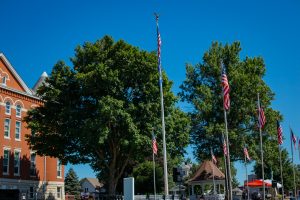The town of Troy, Kansas was established in 1855 as the county seat of Doniphan County. On October 12th, 1855, commissioners A. Payne and Thomas J.B. Cramer located the site for Troy on the southwest quarter of Section 17, Township 3, Range 21. They drove a stake into the ground and marked it as the future county seat.
On October 16th, the County Commissioners ordered James F. Forman to survey 80 acres around the stake into town lots and draft a map. They also designated a 300 foot public square near the stake. The first sale of lots was scheduled for January 1, 1856.
Due to weather delays, the town survey was not completed until spring 1856. The funds from the lot sales were to be used solely for constructing county buildings.
Troy was strategically located about two miles east of the county’s geographical center. This placed it roughly equal distance between other early towns like Iowa Point, Highland, Doniphan, Wathena, and St. Joseph.
The first building constructed in Troy was a frame house built in 1855, now the home of Dr. Myers. That same year, James Rogers built a blacksmith shop, later sold to James E. Marcan in 1856.
In 1856, a courthouse was erected on the current site of the Higby House hotel. Head & Earls opened the first general store, followed soon after by stores run by Mr. Brady and H. Boder. F. Kotch opened the first shoe shop in 1859.
Early professionals setting up shop included Capt. A. Head as Troy’s first lawyer in 1856, and Dr. Payne as the first physician in 1859. John Ogan fired the first bricks in Troy in 1859, using them to construct the town’s first brick building that year.
The post office opened in 1856 with A. Head as postmaster. Connor & Howell set up the first saloon. In 1859, James B. Maynard organized the first Sabbath school.
Troy was a stop on the Pony Express route, with horses being changed at the Smith Tavern. This tavern, built in the 1850s, still stands today.
The town continued growing until the Civil War stalled development in 1862. After the war, the arrival of the St. Joe & Denver City Railroad in the late 1860s revived Troy as a shipping hub.
In 1871, the town of Maynard (later Troy Junction) was laid out at the new railroad junction southwest of Troy. It was named for Judge J.B. Maynard.
Troy was incorporated in 1859-60. It has served as the Doniphan County seat from 1856 up to the present day.



